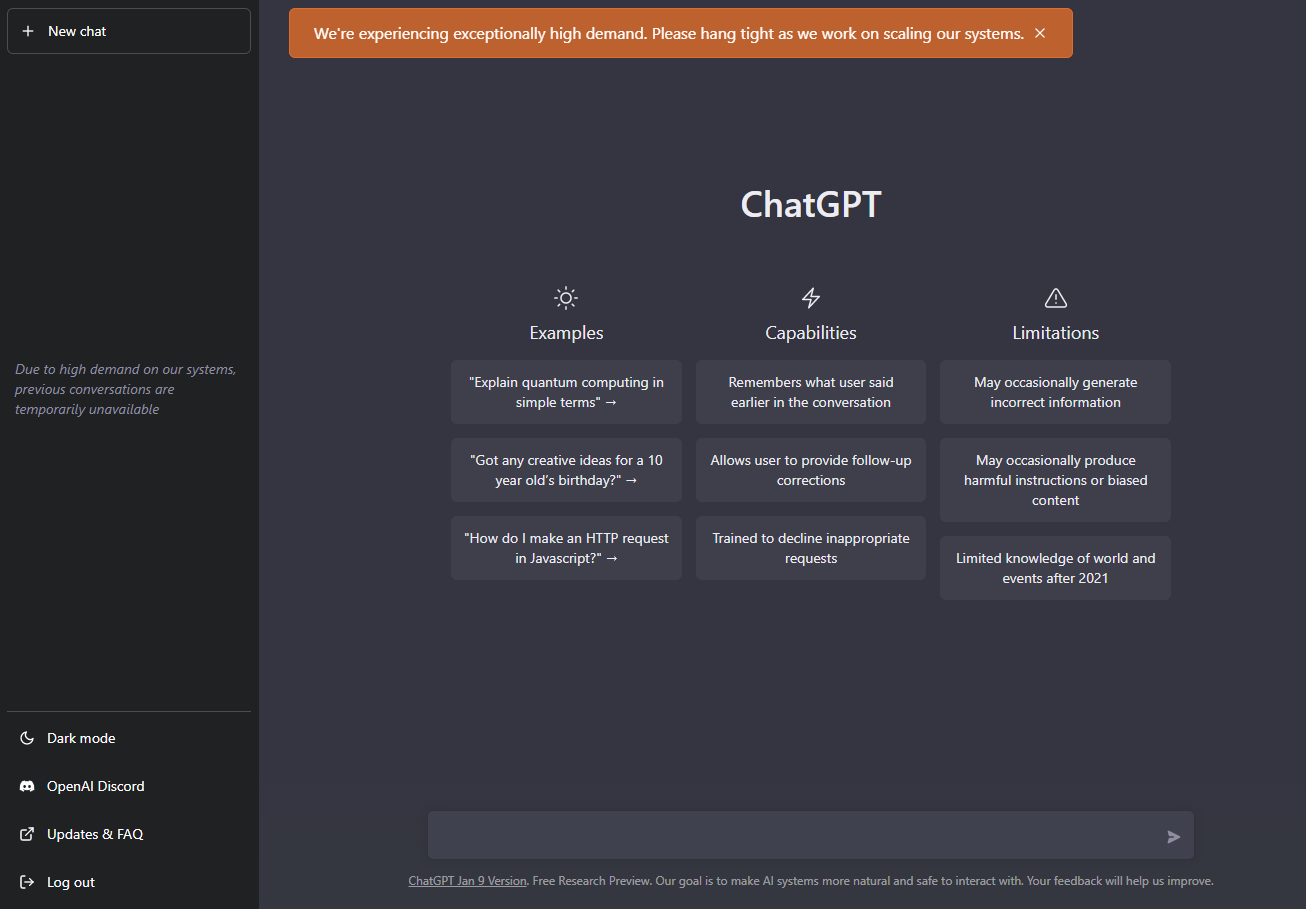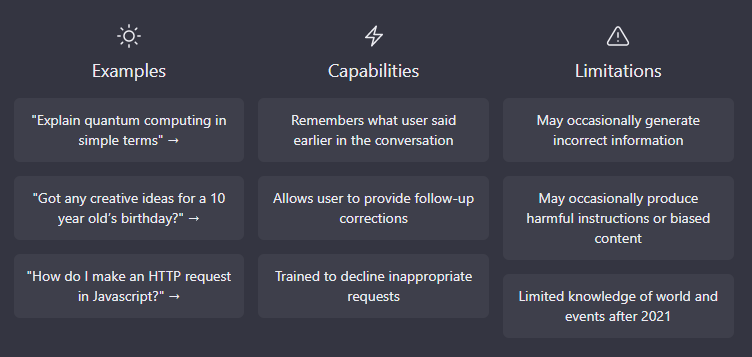ChatGPT has been a hot topic since its release in November 2022, and it’s the latest example of disruptive innovation to hit education. Because of its potential to impact, and possibly transform, multiple aspects of our world, including education, it’s helpful for educators to know at least a little bit about this technology as it becomes more mainstream. This article will serve as an introduction to ChatGPT that covers some of the basics.
In simple terms, ChatGPT is a web-based, artificial intelligence tool developed by OpenAI that generates human-like text responses to questions and word prompts. You type in a question or request, and the program gives you a response in complete, well-crafted sentences. Each response is unique, so if you enter the same query five times, you’ll get five different responses.
As of August 8, 2023, the terms of use state, “You must be at least 13 years old to use the Services. If you are under 18 you must have your parent or legal guardian’s permission to use the Services. If you use the Services on behalf of another person or entity, you must have the authority to accept the Terms on their behalf.” Users must agree to these terms and also set up a free account to use the site.
Once you’ve created your account and logged in, you will be greeted by a simple interface. The home screen has a short menu of options on the left, including prompts to initiate a new chat and clear current conversations. The middle of the screen offers some helpful tips to get you started, and the bottom of the screen features the most important part of the page: a single search box that functions much like a Google search field.

To begin, you can simply type your question or keyword prompts in the search box. The list of ideas on the landing page offers you three examples of what you can enter in the search field to help get you started:
- ”Explain quantum computing in simple terms”
- “Got any creative ideas for a 10 year old’s birthday?”
- “How do I make an HTTP request in Javascript?”
Once you enter your prompt, simply click the enter key on your keyboard or click the send icon located to the right of the search field. ChatGPT will begin providing a response. If your query is complex, it may take a moment for the results to begin appearing. As ChatGPT processes its response, you can watch the application typing out your answer in real time while it’s being generated.
ChatGPT is not connected to the live Internet. Rather, it relies on a massive database of content that includes data and information curated from as recent as 2021. For example, a question about July 4, 2022, returned a response indicating that the program’s training only goes up to 2021.

To begin a query, you must enter a question or command in the search field. Once you submit the query, ChatGPT analyzes its storehouse of information and finds content that its algorithms believe aligns to your request. In many ways, it feels like using a web search engine. One important difference, however, is that instead of providing you with a list of links that you would need to review and synthesize, ChatGPT makes the connections for you and provides you with an answer in complete sentences. It’s important to recognize that while ChatGPT provides you with a response, it does not indicate its sources or how it arrived at its answer.
To provide you with humanlike, narrative responses, the program uses artificial intelligence and predictive text algorithms. Essentially, when you ask a question, it sifts through the billions of articles, words, and sentences in its database, and then generates the most probable response to your query based on its learned examples. To make responses sound more human, it generates sentences based on the styles and formats of the human-composed writing samples found in its database. The artificial intelligence uses these samples to help ChatGPT learn how to write like a human.
Users have already begun sharing countless examples of how they are using ChatGPT. Several examples have generated considerable publicity, including the writing of academic essays and college application letters. Teachers have shared how they have used the program to find lesson plan ideas or to generate writing examples to use in class. Others have used it as a way to get feedback on their own writing samples. A man in Minnesota even used it to write an entire online course about artificial intelligence. There have also been reports of people using it for nefarious purposes, such as generating malicious code and phishing emails.

To help users better understand how the program works, ChatGPT lists three specific capabilities on its homepage. It notes the following:
- “Remembers what user said earlier in the conversation”
- “Allows users to provide follow-up corrections”
- “Trained to decline inappropriate requests”
Because the program remembers earlier conversations, it can use its AI to learn from your queries and adapt to them over time. By intentionally providing follow-up corrections, the program can refine the answers it provides based on your feedback and input. For instance, you might ask the program to provide more specific examples than those included in a first answer. The program will then rewrite its response based on your feedback and include more examples in the next version. This capability of the program to revise its work based on user input creates a unique relationship between AI and human interaction. The human element becomes an important ingredient in refining AI-generated answers.
ChatGPT’s third stated capability claims that the program is trained to decline inappropriate requests. While this sounds reassuring, no definition is provided for what this means, and users have reported being able to get around this restriction by asking creative questions. Because of this ambiguity, this may be one of the claims to watch as the tool continues to develop.
The program also concedes that it has limitations. It lists three:
- “May occasionally generate incorrect information”
- “May occasionally produce harmful instructions or biased content”
- “Limited knowledge of world and events after 2021”
While ChatGPT is fast and convenient, its answers are not always accurate. In fact, sometimes when the program can’t find a good response to your question, it fabricates an answer. Multiple users have reported this happening when they asked for bibliography entries about a topic. Some of the entries were made up, even though they looked legitimate and were posted using official citation formatting. At times, the program will simply acknowledge that it cannot answer your question, as it did with the July 4th example mentioned previously.
Finally, it’s also important to note that because responses are based on content created by humans, the biases and inaccuracies of those content creators will be reflected in the responses. Similarly, because the information is from 2021 and earlier, your results will be limited to content from that time period. ChatGPT is also clear about its inability to predict future events.
Summary
Artificial intelligence programs like ChatGPT are generating both excitement and concern, much like any disruptive technology has done in the past and will likely do in the future.
And this is just the beginning. AI is a rapidly evolving science. In fact, the details of this article are likely to become dated quite quickly as these tools are improved and refined. For that reason, it will be important to continually follow the developments of AI, and in this specific case, ChatGPT. While ChatGPT is the first AI program to hit the mainstream, it is not the only one in development. In fact, Google reportedly has an AI program that is even better than ChatGPT, but they have chosen to not yet release it.
Artificial intelligence will almost certainly be a dynamic field of study in the years ahead, and it has the potential to transform our world, much like electricity, the automobile, the personal computer, and the internet have done. Stay tuned.
Extend Your Learning
- Terms of Use (OpenAI)
- ChatGPT Is a Tipping Point for AI (Harvard Business Review)
- AI Will Go Mainstream in 2023 (TechSpot)
- LaMDA: Our Breakthrough Conversation Technology (Google)
- ChatGPT: Grading Artificial Intelligence’s Writing (CBS News)
